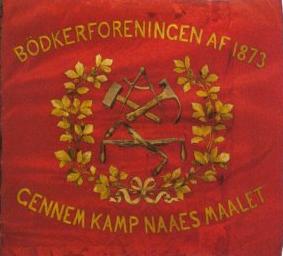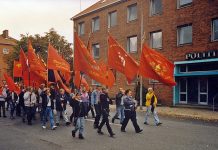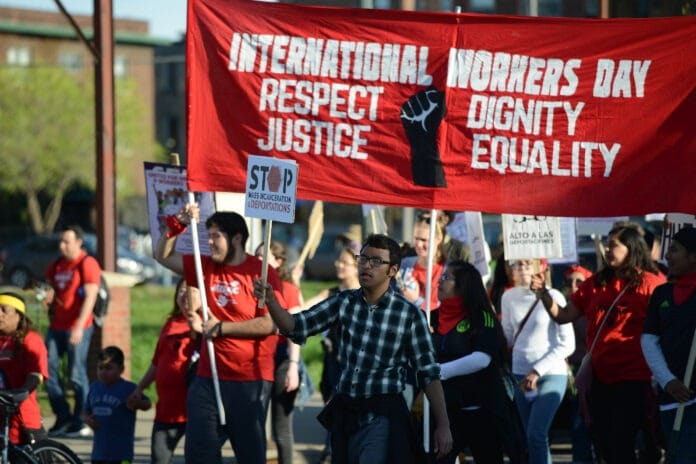
Links til faglige organisationer og arbejdsmarkedet, samt materiale om arbejderbevægelsens historie i Danmark og internationalt. Hovedparten af materialet er på dansk, med en mindre gruppe engelsksprogede sites om internationale forhold + artikler om arbejder- og fagforeningshistorie. Desuden en Se også med hovedsageligt engelsksprogede artikler om arbejderklassen, fagforeninger og klassekamp, historisk og aktuelt.
Indhold
Danske
Internationalt
Arbejder- og fagforeningshistorie
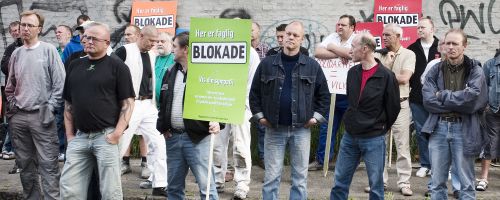
Forord
Hovedvægten i emnelisten er på det faglige område, fagbevægelse og arbejdsmarked, men der er også materiale om arbejderbevægelsens historie i Danmark og internationalt. De fleste sites er på på dansk, med en mindre gruppe engelsksprogede sites om internationale forhold.
Bjarne A. Frandsen
1. maj 2004
Ajourført og revideret november 2008/januar 2020.
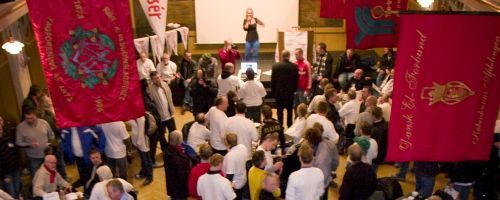
Danske
Resurser
Arbejdermuseet & Arbejderbevægelsens Bibliotek og Arkiv
Biblioteket har en større samling bøger og tidsskrifter om dansk og international arbejderbevægelses historie. Se deres tema om Arbejderhistorie og partiprogrammer online fra arbejderbevægelsens og venstrefløjens politiske partier og organisationer.
AE Rådet (Arbejderbevægelsens Erhvervsråd)
Økonomisk tænketank (Socialdemokratisk orienteret).
Arbejdsdirektoratet
Arbejdsdirektoratet er en enhed under Beskæftigelsesministeriet, og administrerer lovene om arbejdsløshedsdagpenge, efterløn, feriepenge mv. Sitet har megen nyttig information og lovmateriale (love, bekendtgørelser, cirkulærer og vedledninger).
Arbejdsretten
“Sitet indeholder oplysninger fra Arbejdsretten, Tjenestemandsretten og Den kommunale Tjenestemandsret. Desuden oversigt over retsmøder og afgørelser.”
FH (Fagbevægelsens Hovedorganisation)
Se Analyse og dokumentation.
3F (Fagligt Fælles Forbund)
Sektioner: Nyheder, Løn og arbejde, herunder: Internationalt, Uddannelse, Arbejdsmiljø + 3F’s Faglige førstehjælp. 3F udgiver magasinet Fagbladet.
FAOS (Forskningscenter for Arbejdsmarkeds- og Organisationsstudier)
Arbejdsmarkedets begreber
“Her finder du en række begreber, der er centrale for reguleringen af arbejdsmarkedet. Under de enkelte punkter finder du korte og overskuelige tekster, der definerer de enkelte begreber samt uddybende fakta-oplysninger og historisk baggrund.”
Ulandssekretariatet
“Ulandssekretariatet er den danske fagbevægelses bistandsorganisation og har som formål at hjælpe fagbevægelsen i ulandene. Det gør vi ved at gennemføre projekter, der udvikler deres organisation, uddannelse, arbejdsmiljø og rolle på arbejdsmarkedet. På denne måde arbejder vi for at skabe bedre arbejdsvilkår, økonomisk udvikling og demokrati i udviklingslandene.”
Forbund
Fagbevægelsens Hovedorganisation (FH)
“Talerør for 1.4 mio om arbejdsmiljø, uddannelse, velfærd, ulighed, arbejdsret, overenskomst økonomi og EU.”
Se Medlemsorganisationer + Medlemstal.
Ungdom
- Jobpatruljen
“Jobpatruljen er fagbevægelsens hjælp til unge med fritidsjob” - Faglig Fælles Ungdom (3FU)
- FOA Ungdom
- HK Ungdom
- Metal Ungdom
- 3F Ungdom
Andre netværk og sites
Aktionsgruppen Arbejdere Akademikere (AAA)
“Aktionsgruppen er arbejdere og akademikere. Vores styrke er, at vi udnytter hinandens viden og erfaringer, så vi kan lave materialer og oplysning, som alle kan bruge i kampen for et bedre arbejdsmiljø.”
Arbejderen.dk
Udgives af Kommunistisk Parti.
Sektion: Fagligt
A4 Arbejdsliv
“A4 er portalen, der går i dybden om danskernes arbejdsliv og det danske arbejdsmarked.”
Sektion: Arbejdsmarked
EU-fagligt Netværk
“Det EU-faglige netværk ‘Fagbevægelsen mod Unionen’ er en sammenslutning af fagforeninger, forbund og faglige klubber, samt valgte tillidsrepræsentanter og faglige med andre tillidshverv.”
FaktaLink
- Arbejderbevægelsens historie
- Arbejderbevægelsen. Af Nina Trige Andersen (april 2020)
- Den danske model. Af Kristoffer Granov (december 2013, opdateret af Nina Trige Andersen, april 2020)
FAOS
“Forskningscenter for Arbejdsmarkeds- og Organisationsstudier [som] har specialiseret sig i studiet af arbejdsmarkedsrelationer i dansk, nordisk og europæisk sammenhæng.”
Se Temasider: “FAOS har samlet publikationer, analyser og faktaark på temasider om aktuelle emner.”
Leksikon for det 21. århundrede (Leksikon.org)
Dansk venstrefløjs-leksikon udgivet af forlaget Solidaritet. Har emnegrupper og et alfabetisk artikelindex (ABC). Blandt meget andet se også den grundige omtale af lande fra hele verden med historie og statistik.
Med tema: Arbejderbevægelsen
Solidaritet.dk
“Solidaritet er et demokratisk mediehus. Vi er uafhængige af partier og organisationer, men vi er ikke politisk neutrale – vi er socialister.”
Tags: Arbejdsmarked
Se også:
Fællesskab gør en forskel: En APL III-forskningsrapport om lønmodtagerinteresser og værdier belyst ud fra interviews (pdf). Af Emmett Caraker (LO og FTF, december 2017, 207 sider).
Se interview + omtale:
Camilla følte sig svigtet af sin fagforening og meldte sig ud. Af Gitte Redder (Ugebrevet A4, 20. december 2017). Interview med Emmett Caraker.
Lønmodtagerne til fagbevægelsen: Gå i krig mod New Public Management. Af Gitte Redder (Ugebrevet A4, 20. december 2017)
Se også om 2015-rapport fra Center for Arbejdsmarkedsforskning, Aalborg Universitet: De unge er vilde med fagbevægelsen. Af Gitte Redder (Ugebrevet A4, 21. oktober 2015).
Internationale
Forbund mv.
Global Unions
Fælles site for internationale faglige organisationer.
International Trade Union Confederation (ITUC)
ITUC er verdens største faglige sammenslutning og blev dannet i 2006 som en sammenslutning af ICFTU og WCL. ITUC representerer 166 millioner arbejdere gennem 309 tilsluttede organisationer i 156 lande.
Wikipedia, the free encyclopedia
List of federations of trade unions
Resurser
Global Labor Strategies
“Ideas and resources for the global labor movement … Our aim is to present news and comment on how labor unions, worker organizations, and their allies are confronting globalization.”
Sitet har nyheder og analyser og en emnemæssig Categories.
International Labour Organization (ILO)
Sitet indeholder en lang række artikler og nyheder om overgreb på arbejdere, faglige forhold og aktuelle kampagner. Se også deres sektion: Labour statistics
LabourStart
“Where trade unionists start their day on the net.” Se Todays Labour News, opdelt på regioner og lande.
Union Songs
“This website is a reference source for union and workers’ songs.”
Wikipedia, the free encyclopedia
- Trade union
- Labour movement
- Organized Labour Portal
Omfattende site med artikler og links om arbejderbevægelse og fagbevægelse, historisk og politisk; se Categories and Topics
Arbejder- og fagforeningshistorie
Danske/Nordiske
Arbejdermuseet & Arbejderbevægelsens Bibliotek og Arkiv
Arbejderhistorie: “Her kan du finde artikler om hovedpersonerne i den danske arbejderhistorie, om de politiske strømninger og om de slagsmål, der har haft allerstørst betydning for de arbejdsmæssige forhold, vi har i dag. Vi har inddelt siden her i 3 indgange: Kildepakker er undervisningsmateriale og baggrundsstof til undervisningsbrug. Arbejderhistoriske temaer er en række klassiske emner inden for arbejderhistorien … Plads til os alle var en dokumentarserie, der blev lavet i 1990’erne af DR, og Arbejderbevægelsens Bibliotek og Arkiv supplerede med artikler, billeder og gode historier. Se også Partiprogrammer online (fra arbejderbevægelsens og venstrefløjens politiske partier og organisationer).
Arbejderhistorie
“Tidsskriftet redigeres ud fra en rummelig fortolkning af begrebet arbejderhistorie. Du finder naturligvis artikler om arbejderbevægelsens historie. Men du finder også artikler om køn, familie, sundhed, moral og en bred vifte af andre emner indenfor det 19. og 20. århundredes social- og idehistorie.”
Tidsskriftet er online 1995- . Efter to år lægges det enkelte nummer online.
Knud Knudsen: Dansk arbejderhistorie efter 2000 (pdf) (nr.2, 2020, s.107-130).
Fagbevægelsens Hovedorganisation (FH)
LO’s historie – Store begivenheder (pdf, 37 s.)
“På disse sider kan du få et overblik over de spændende og ofte dramatiskehistoriske begivenheder, som har lagt kimen til nutidens fagbevægelse. Fortællingen spænder fra baggrunden for LO’s oprettelse i 1898 til midt i 90erne – 100 års LO historie.”
Fagbevægelsens Interne Uddannelser (FIU)
Fagbevægelsens historie (pdf). Af Niels Finn Christiansen (2012, 89 sider). Rigt illustreret og med Litteratur om fagbevægelsens historie (side 88-89).
Leksikon for det 21. århundrede
Niels Finn Christiansen: Fagbevægelsen i Danmark
Knud Knudsen: Arbejdskonflikter i Danmark
Til slut i artiklen er der links til artikler om vigtige danske strejker, især efter 1969, og til et udvalg af strejkepjecer i fuldtekst.
For en række relaterede artikler i leksikonet, se menu tv. for artikelteksten.
Se også temaet: Arbejderbevægelsen
Bøger
Arbejdernes historie i Danmark 1800-2000. Af Lars K. Christensen, Søren Kolstrup og Anette Eklund Hansen (SFAH, 2007, 464 sider)
Med temaartikler af Claus Bryld, Niels Finn Christiansen, Knud Knudsen, Jytte Larsen, Erik Strange Pedersen og Morten Thing + en kommenteret litteraturoversigt (s.415-40).
Kampen for en bedre tilværelse: arbejdernes historie i Danmark fra 1800-tallet til 1990. Af Knud Knudsen, Hanne Caspersen og Vagn Oluf Nielsen (SFAH, 1991, 372 sider)
Med kommenteret litteraturoversigt (s.347-58).
A brief history of the Danish labour movement (oktober 2009; online på Socialistisk Bibliotek)
“The text was originally published in print as a summary for the book Kampen for en bedre tilværelse, published by SFAH in 1990 + a new chapter on the last period 1982-2000.”
Fremad og aldrig glemme: ti års forskning i arbejderbevægelsens historie – status og perspektiver. Redigeret af Gerd Callesen, Hanne Caspersen og Knud Knudsen (SFAH, 1981, 328 sider)
Bogen har større emneopdelte litteraturfortegnelser om bl.a. dansk arbejderbevægelses historie 1870 til 1970erne (s.63-81 + 124-35), om Socialdemokratiet og fagbevægelsen (s.206-12) og om arbejderkvinders historie (s.245-49).
Engelsksprogede
Marxists Internet Archive
Sektion: Marxism and Workers’ Organization
“Writings of Marxists on Trade Unions, the General Strike, Soviets and Working Class Organisation.”
Wikipedia, the free encyclopedia
Organized Labour Portal
Omfattende site med artikler og links om arbejderbevægelse og fagbevægelse, historisk og politisk; se Categories and Topics
World Wide Web Virtual Library: Labour History
Site hos the International Institute of Social History i Amsterdam.
Se Special Topics med sektioner om bl.a. Anarchism, Gender, Labour, Marxism
Se også:
Podcast: Strejkelitteratur (Solidaritet.dk/Radioaktiv, 13. oktober 2019, 56:55 min.) (Kulturkanonen, 2). “Interview med Nicklas Freisleben Lund, der netop har vundet Arbejderhistorieprisen for sin ph.d.-afhandling om strejkelitteratur.”
Se også Nicklas Freisleben Lund: I ambivalent kamp: Strejken og romanen, 1850-1950 (pdf) (Københavns Universitet, Det Humanistiske Fakultet, 2018, 211 sider) + I tvivlsomme kampe: strejken og romanen, 1850-1950 (pdf) (Kultur & Klasse, nr.123, 2017, side 213-232).
A brief history of the Danish Labour Movement (oktober 2007; online at Socialist Library)
“The text was originally published in print as a summary for the book Kampen for en bedre tilværelse, published by SFAH in 1990 + a new chapter on the last period 1982-2000.”
De många avskeden till arbetarklassen (pdf). Av David Broder (Marxistakiv.se, 30. september 2021). Oversat fra Jacobin Magazine (No. 42, Summer 2021)
“Har den moderna samhällsutvecklingen gjort den ‘traditionella’ arbetarklassen överspelad för en socialistisk organisation? Broder tycker inte det.”
Marxism and the trade unions. By Hal Draper (Marxists Internet Archive)
“These texts are transcripts of a series of talks held in October/November 1970: Marxism and Trade Unions – Working class lifestyle and the radical sect – Rank and file organization in the Labor movement – Dual unionism.”
Why the working class. By Hal Draper (SocialistWorker.org, September 14, 2012)
“For a May Day issue of the Labor Action newspaper in the early 1950s [Vol.19, No.19, May 9, 1955], Draper wrote the following article about the centrality of working class struggle to the Marxist tradition.”
Why the industrial working class still matters. By Kim Moody (Against the Current, Issue 58, September/October 1995)
“During the 1980s the theorists of post-industrialism, post-modernism and/or flexible specialization dismissed the industrial working class from the stage of history.”
Why we should recognise the Unions: Marx and Engels’ position on Trade Unionism as expounded in the works of Hal Draper. By Sheila Cohen (New Interventions, Vol.6 No.1, 1995)
“In what follows, we will refer both to Draper’s own argument, and to the writings of Marx and Engels which he cites, to analyse more closely the two sides of this coin and their implications for trade unionism and socialism today.”
The workers of the world. By Chris Harman (International Socialism, Issue 96, Autumn 2002, p.3-45)
“The overall picture is not one of a disintegrating or declining working class. It is one of a working class that on a world scale has grown bigger than ever, even if the rate of growth has slowed down with the successive crises in the world economy and the tendency everywhere to ‘capital intensive’ forms of production that do not employ massively new numbers of people.”
Forces of Labor: Worker’s movements and globalization since 1870. By Beverly J. Silver (Cambridge University Press, 2003, 238 p.; online at Libcom.org)
“Beverly Silver has written an important, accessible and excellent book that contributes significantly to our understanding of workers’ bargaining power under global capitalism.” See Ian Allison: Remaking the working class and its power (RS21, June 1, 2014)
Can the working class change the world? By Michael D. Yates (Monthly Review, March 21, 2004)
“Those who write it off as reactionary or too nationalistic or racist or sexist or not attuned to the environment cannot offer us an agent to replace it. Of course, if we look to our history, we do see that workers have been all of the things those … But we also see that workers have done the most remarkable things too, and have shown the world what collective solidarity and the action based upon it can do.”
Is the U.S. becoming post-industrial? The changing working class (International Socialist Review, Issue 52, March-April 2007)
“Adam Turn examines the argument that we have entered a new post-industrial age, and its corrollary, that the working class is no longer capable of mounting a collective challenge to capitalism.”
The shape of the working class. By Martin Smith (International Socialism, Issue 113, Winter 2007, p.49-70)
“Are we all middle class now? What does the working class look like in Britain today? Are the trade unions finished? These are the questions I want to attempt to answer. I also want to refute the notion that the working class is in decline, arguing instead that it is becoming larger and more diverse in its make up.”
Myths of globalisation and the new economy. By Bill Dunn (International Socialism, Issue 121, Winter 2009, p.75-97)
“Much of the left accepts one element in ‘third way’ ideology. This is the claim that globalisation has fundamentally weakened worker’s capacity to fight. Bill Dunn marshals a mass of material to show why this argument is wrong.”
The global reserve army of labor and the new imperialism. By John Bellamy Foster, Robert W. McChesney, and R. Jamil Jonna (Monthly Review, Vol.63, No.6, November 2011, p.1-31)
“In the last few decades there has been an enormous shift in the capitalist economy in the direction of the globalization of production. Much of the increase in manufacturing and even services production that would have formerly taken place in the global North – as well as a portion of the North’s preexisting production – is now being offshored to the global South.”
Marxism and Trade Unionism. By John Molyneux (Irish Marxist Review, Issue 1, March 2012, p.18-30; online at John Molyneux Blog)
“… it is useful to go back to basics: to revisit the basic Marxist analysis of trade unions; to review the history of some of the debates about trade unionism in the Marxist movement and the to ask whether Irish trade unions today constitute a ‘different’ and ‘special’ case, or if, broadly speaking, the traditional Marxist attitude to trade unionism remains valid in Ireland today.”
Class in the 21st Century. By Göran Therborn (New Left Review, Issue 78, November-December 2012, p.5-29)
“From Sao Paulo to Beijing, a rising middle class has been hailed by liberal commentators as a bulwark for consumption and democracy in the decades ahead. Taking stock of these claims, Göran Therborn offers a magisterial overview of the global class landscape and the still prodigious numerical weight of manual workers within it.”
New divisions of labour in the global economy. By Jane Hardy (International Socialism, Issue 137, Winter 2013, p.101-125)
“Jane Hardy dissects the argument that capital has become footlose, changing countries and ‘delocalising’ the global South at will.”
The disappearing working class? By Paul D’Amato (SocialistWorker.org, December 16, 2014)
“Some analysts claim we have entered a ‘post-industrial’ society in which automation is shrinking, if not eliminating, the working class. As a result, workers no longer have the power that Marx attributed to them.”
The crisis of world Labor. By Marcel van der Linden (Against the Current, Issue 176, May-June 2015)
“Both the size and composition of the world working class have changed dramatically over the past four decades. But these massive shifts are not reflected in the strength of workers’ organizations.”
Why the working class? By Vivek Chibber (Jacobin: Reason in Revolt, March 13, 2016)
“Workers are at the heart of the capitalist system. And that’s why they are at the center of socialist politics.” See also Vivek Chibber: Why we still talk about the working class (Ibid., 15 March 2017).
Marx’s Theory of working-class precariousness: Its relevance today. By R. Jamil Jonna and John Bellamy Foster (Monthly Review, Vol.67, No.11, April 2016)
“The structural basis of Marx’s concept of worker precariousness was the reserve army of labor, the fulcrum of the general law of capitalist accumulation.”
The remaking of the global working class. By Beverly Silver (ROAR Magazine, Issue 2, Summer 2016)
“The labor movement is far from dead—if anything, the upsurge of labor unrest and class-based mobilization since 2008 signals that the tide is turning.”
Workers of the World (Jacobin: Reason in Revolt, September 29, 2016)
An interview with Beverly J. Silver: “The potential for workers to resist capital is as strong as ever.”
Which way to the barricades? By Steve Fraser and Nelson Lichtenstein (Jacobin: Reason in Revolt, May 1, 2017)
“What was the mass strike and what would a successful one look like today?”
The changing working class: challenges and new potentials (International Socialist Review, Issue 109, Summer 2018). Geoff Bailey interviewed Moody earlier this year.
See also Nancy Welch: Putting the working class back at the center of resistance (ibid.). Review of Kim Moody, On New Terrain: How Capital is Reshaping the Battleground of Class War (Haymarket Books, 2018, 287 p.).
A new beginning? (Weekly Worker, Issue 1219, September 20, 2018)
“Marcel van der Linden examines the state of the global labour movement.”
Why You Should Be A Trade Unionist. By John Westmoreland (Counterfire, April 16, 2020) “Len McCluskey’s short book [Verso, 2020, 145 p.] gives us a powerful run through the arguments for working-class organisation.”
The working class is the vast majority of society. By Hadas Thier (Jacobin, September 13, 2020)
“Class isn’t just about how much money you make, and it’s certainly not about cultural traits or your level of education. Marxists argue that anyone who must sell their ability to work for a wage and can’t produce their life necessities for themselves is part of the working class.”
Workers of the world: growth, change, and rebellion. By Kim Moody (New Politics, No.70, Winter 2021)
“An examination of the global working-class labor force in the twenty-first century.”
Commonsense solidarity: how a working-class coalition can be built, and maintained. By Editors (Jacobin, November 11, 2021)
“An experimental study, the first of its kind, from Jacobin, YouGov, and the Center for Working-Class Politics offers a new and powerful perspective on working-class political views.”
World Protests: A Study of Key Protest Issues in the 21st Century. By Isabel Ortiz, Sara Burke, Mohamed Berrada and Hernán Saenz Cortés (Palgrave Macmillan, 2021, 185 p.). “Surveys nearly three thousand protests in 101 countries from 2006 to 2020. Offers insights into the demands, demographics, methods, and outcomes of protests throughout this period.” See also World Protests Platform (site).
Jane McAlevey’s organising model: is it a rank and file strategy? By Paul Brook (International Socialism, Issue 174, Spring 2022, p. 81-115). “The union organising model associated with Jane McAlevey has a growing influence among union activists in Britain and internationally.” See also Ian Allinson: Lowering expectations: misrepresentations of McAlevey (RS21, 6 May 2022) + Jane McAlevey’s site.
An activists’ guide to trade union leaders and the rank-and-file. By Martin Upchurch (Socialist Worker, Issue 2819, 19 August 2022). “Times of growing class struggle raise big questions about the nature of the trade union bureaucracy and the potential for rank-and-file activity.”
A new activist’s guide to strikes, unions and struggle (Socialist Worker, Issue 2832, 18 November 2022). “It’s great that new people are getting involved in strikes themselves or in building solidarity. Here Sarah Bates answers some of the questions that these activists have raised in meetings.”
See Part 2: A new activist’s guide to strikes and unions (Socialist Worker, Issue 2833, 26 November 2022). “New people are involved in strikes themselves or building solidarity. Here Sam Ord answers more questions that activists have raised in meetings.”
The Great Denial: Why they don’t want us to talk about class. By Chris Nineham (Counterfire, September 24, 2022)
“One of the great paradoxes of the last 40 years has been that just when society has become more unequal than at any time for a century, class had dropped out of the discussion.”
Marxism and Class: Whatever happened to the western working class? (September 30, 2022). “In the second in the series on class, Chris Nineham shows that the working class is as central as ever to capitalism here and across the world.”
Marxism and Class: Class analysis or identity politics? (October 7, 2022). “In the third part of the series on class, Chris Nineham explains why a class analysis is needed to understand and fight oppression.”
Marxism and Class: Capitalism and class consciousness (In the fourth part of the series on class, Chris Nineham explains how a revolutionary class consciousness can be developed.”
Marxism and Class: Southern storms – Class in the developing world (October 22, 2022). “In the fifth part of the series on class, Chris Nineham demonstrates the centrality of working-class struggle in the Global South.”
Marxism and Class: The working class and revolution (October 30, 2022). “In the final part of his series, Chris Nineham applies some of the lessons of the twentieth century to our current predicament.”
















